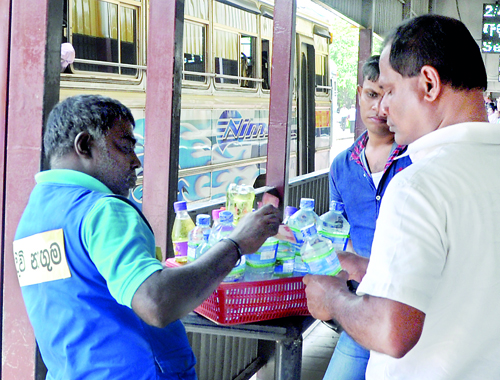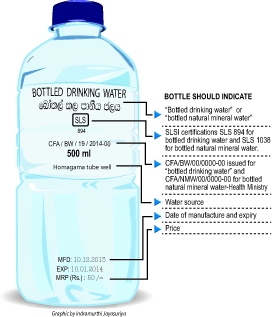News
Water, water everywhere but think before you drink!
Every day in offices and hospitals people stroll up to a public water dispenser and pour themselves what they think is a cup of purified clean water – the cooler labels carry that assurance – but investigators have turned up a racket of dirty water substituted for clean cooler water.

Vendors selling bottled water at the main bus stand in Pettah. Pic by Nilan Maligaspe
Public Health Inspectors Union President Upul Rohana said PHIs island-wide have received complaints about mud-like particles or discolouration in water from 15-20 litre bottles used in dispensers, and also of change of taste and suspicious-looking bottles without labels. Investigations have revealed that containers are being refilled with plain tap water or well water and passed off as purified water.
The substitution takes place during transport of the containers, Mr Rohana said, adding that the public should show greater care for the safety of what they consume.
“It is important to check the label as seals can be fraudulently replaced with sealing equipment without raising suspicion. If the labels are missing there is a possibility that the water has been substituted. If there is an unnatural taste or appearance or no label a complaint should be lodged either with the company, the local PHI or the Consumer Affairs Authority,” he said.
He said that in a raid in Polonnaruwa, PHIs found bottles refilled in Polonnaruwa and sold with the water source given as Gampaha.
“Though there have been many raids, selling refilled cool water in long-distance buses still takes place,” he added. “But we don’t get complaints from the public. There still seems to be a lack of concern among the general public about checking the quality of water people pay to drink,” he  said.
said.
Bottled water are given two certifications, one from the Health Ministry and the Sri Lanka Standards Institute. CFA/BW/00/0000-00 is issued for bottled drinking water while CFA/NMW/00/0000-00 is given for bottled natural mineral water by the Health Ministry’s Food Control Unit and has to be renewed every three years.
SLSI issues standard certifications SLS 894 for bottled drinking water and SLS 1038 for bottled natural mineral water.
Mr. Rohana said the label should include the registrations from the Health Ministry and SLSI as well as the date of manufacture and expiry as well as the water source.
Under the Food Act, re-labelling is an offence that can attract fines from Rs. 500-3,000 as well as a sentence of six months imprisonment, and if purified water is contaminated with e-coli or bacteria the fine can be Rs.10,000 and a six-month sentence, Mr. Rohana said.
National Water Supply and Drainage Board’s Chief Chemist H.A.K. Amarakoon said the purification of tap water is effective for only for 24 hours but bottled water is purified so that the contents are sterile for a month, and in some instances for up to six months.
“Chlorine is used as tap water disinfectant while ozone treatment is used in bottled water operations. Ozone (O3) is a gas and a strong oxidising agent and is much more effective than chlorine,” he added.
The Sunday Times also received the sobering information from the head of the National Poisons Information Centre, Dr. Waruna Gunetillake, said that the chemical, phthalate group is used to manufacture plastic bottles and exposure to it can increase cancer cell growth, enlargement of the prostate and other adverse effects such as genital abnormalities, kidney problems and skin irritation.
“Bottled water should be limited to one use and the filled bottles should not be exposed to sunlight or extreme warmth, even inside a vehicle. The World Health Organisation does not recommend bottled water for babies due to the chemical content,” he said.
Colombo’s Chief Food Inspector Lal Kumara also said that in Colombo several complaints have been received over the resealing of used water bottles.
“We are inspecting bottled water of the main bus stand in Pettah and we have recovered large numbers of used bottles re-filled with tap water and resealed,”
he said.

